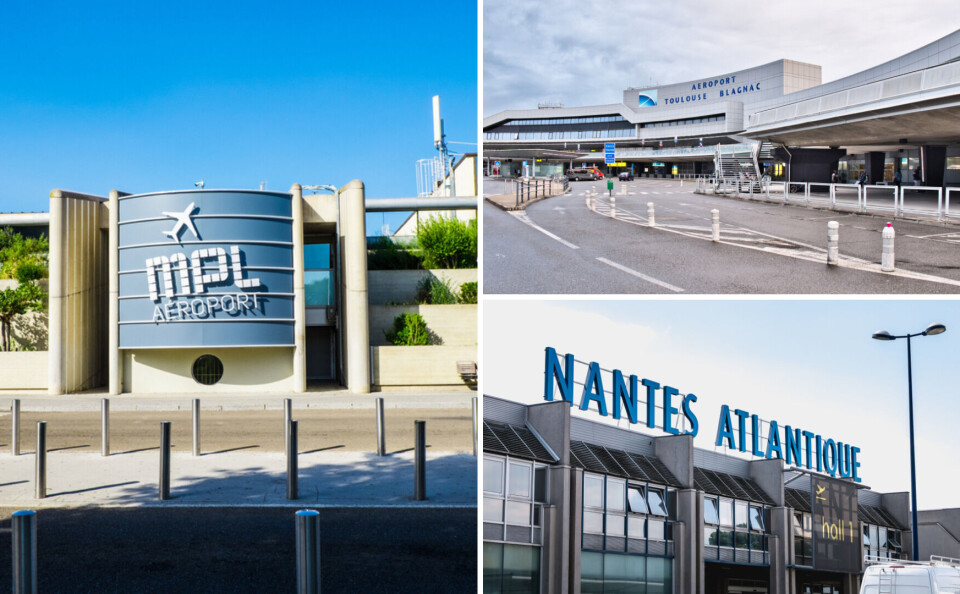-
White storks make strong return in France via nest ‘platforms’ and clipped wings
The Ligue pour la Protection des Oiseaux shares the conservation challenges in saving these birds from extinction
-
Hosting scheme in south-west France lets newcomers sample lifestyle
Households in nine Dordogne communes volunteer under Mes Nouveaux Voisins scheme
-
French boulangeries demand right for staff to work on May 1 so they can open
Artisan bakery owners can work but employees cannot, while certain industrial bakeries are allowed to remain open with workers
Bomb threats continue at French airports, many flights cancelled
We look at whether delayed travellers can receive compensation

Bomb alerts and evacuations are continuing at French airports for a second day - we look at what recourse is available for passengers whose travel plans are disrupted.
17 airports went on alert and 15 were temporarily evacuated on Wednesday (October 18) resulting in cancelled flights and disrupted travel for many passengers.
Another bomb threat led to the evacuation of Montpellier airport on Thursday (October 19). The airport was closed at 11:00 with bomb disposal teams dispatched to investigate.
⚠️🚨 Alerte à la bombe à l’aéroport de #Montpellier @MPLaeroport
— Préfet de l'Hérault 🇫🇷 (@Prefet34) October 19, 2023
🔹évacuation et mise en sécurité des personnes
🔹forces de l’ordre présentes sur site pour établir un périmètre de sécurité
🔹démineurs déclenchés pour une levée de doutes. pic.twitter.com/8A8I5THORm
Read more: Multiple French airports evacuated over bomb threat call-ins
Fortunately, no bomb was found in Montpellier and the airport was open again by the afternoon.
The threats on Wednesday also proved to be hoaxes, but the disruption that they caused was very real: 130 flights were cancelled due to the alerts and evacuations, resulting in innumerable delays.
“These hoaxes are not just bad jokes. They are crimes. They will be punished,” tweeted Transport Minister Clément Beaune.
17 aéroports menacés.
— Clément Beaune (@CBeaune) October 18, 2023
15 aéroports évacués.
130 vols annulés. De très nombreux retards.
Ces fausses alertes ne sont pas des mauvaises blagues. Elles sont des délits. Elles seront sanctionnées.
Une plainte a été déposée pour chaque menace. Avec une saisine du procureur @DGAC https://t.co/fSlsdhKMrH
What can passengers do about their cancelled flights?
Affected passengers may want three things: compensation for their disrupted onward travel, a refund for the cancelled tickets, or simply to find a place to stay while waiting for a new flight.
Compensation will prove difficult.
Unfortunately for passengers, bomb scares, as with all major security risks, are considered to be ‘extraordinary circumstances’ under both EU law and the 1999 Montreal convention governing airline liability.
“Obligations on operating air carriers should be limited or excluded in cases where an event… could not have been avoided even if all reasonable measures had been taken,” according to Article 14 of the EU regulations concerning compensation and assistance to passengers.
Similar regulations on ‘extraordinary circumstances’ are likely to apply also to travel insurance, depending on the policy.
This means that in theory airlines and insurers do not have to compensate passengers for disrupted travel.
Refunds are possible.
Airlines have a duty of care for their passengers even when flights are cancelled due to ‘extraordinary circumstances.
This means that the airline must offer to refund the tickets of cancelled flights.
“Passengers whose flights are cancelled should be able either to obtain reimbursement of their tickets or to obtain re-routing under satisfactory conditions, and should be adequately cared for while awaiting a later flight,” according to Article 13 of the same EU regulations
Airlines should help people find a place to stay while waiting
The duty of care extends to ensuring that passengers are provided with hotel accommodation while waiting for a travel solution.
Airlines are not permitted to simply abandon their passengers.
Remind airlines of their duty of care
If you have been affected by a cancelled flight and want compensation, a refund or a place to stay it is important to contact the airline, insistently.
While airlines are sometimes forthcoming with assistance, they can appear unresponsive or dismissive of passengers’ concerns during periods of mass cancellations.
If they do not heed your requests, you should contact the Travel Mediation service, or a consumer association.
Read also
Ryanair to cancel many European flights due to plane delivery delays
Ryanair and Bordeaux airport in row as disabled woman left off flight
























